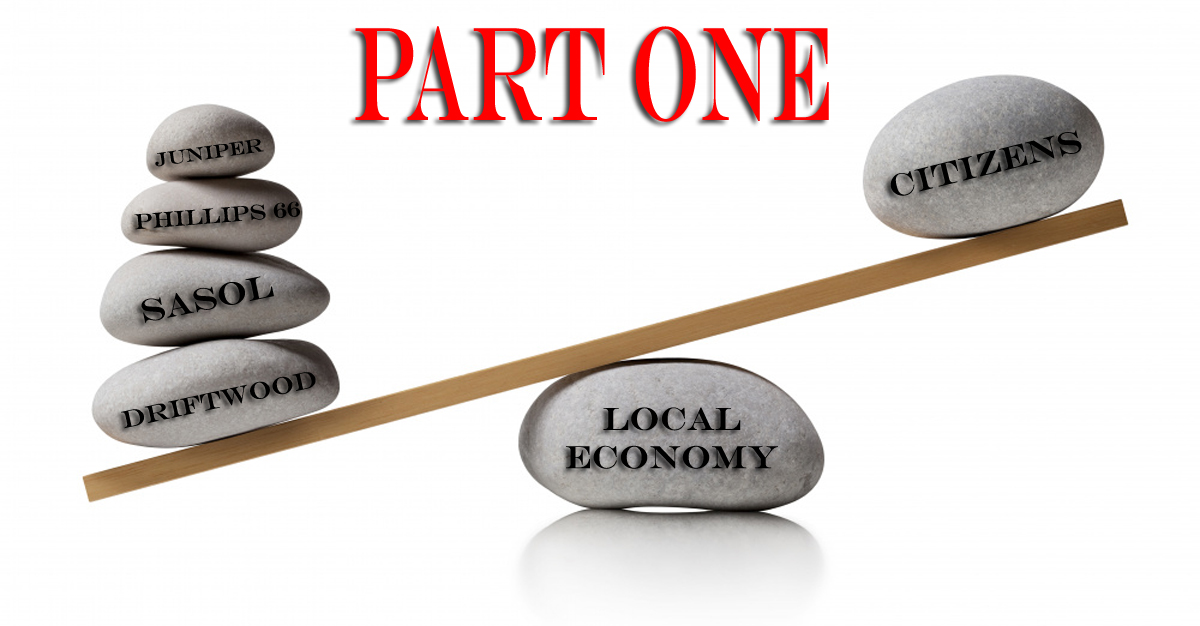

Despite enormous push back and passionate testimony from citizens, on Friday, December 14th, the Louisiana Board of Commerce and Industry approved what is arguably the largest property tax exemption ever granted in the nation. Tellurian Inc., the applicant of the Industrial Tax Exemption Program (ITEP), could potentially be relieved of two billion dollars in property tax liability for its planned project, Driftwood LNG. A representative of Tellurian expressed a dire need to receive the exemption for the project to move forward without providing much detail. You can read more about the reasons by clicking this link.
I’ll bet you’re wondering. What is ITEP? Why is it needed? Why the push back from the public? To answer the first question, ITEP is a state program designed to entice businesses into locating in Louisiana by offering incentives. In this case, relief from paying ad valorem taxes, also referred to as property taxes. The reason ITEP is needed is because states compete with each other to draw business and industry. The states along the Gulf coast are particularly competitive when it comes to large industries that do business nationally, or worldwide, and need access to ports, waterways and railways. These locations also have large populations of employable blue-collar workers, which is beneficial to both the businesses and the communities.
The primary reason for public push back is simple. In general, the people are tired of being asked to approve tax propositions by local government entities while they forgo tax revenue that could fund their needs. The ITEP program has been in place for thirty years, and approved at the state level, largely without restraint. In 2016, Governor John Bel Edwards issued an executive order that would require ITEP applicants to get approval from local government entities prior to approval at the state level. It was a bold move, and a good move; however, when policies are put in place to rein in business and industry, you can always expect that there will be an attempt to circumvent the policy. After all, billions of dollars are at stake. In February 2018, I revealed that an ad hoc committee referred to as the “taxing authority committee” (Click here to read) was put in place in Calcasieu parish to circumvent the policy; in violation of public meeting law.

In Friday’s meeting, the Board of Commerce and Industry was presented with a petition signed by 1000+ residents of Lake Charles, evidence of violation of public meeting law, and a letter from a school board president in his personal capacity as a citizen stating that he didn’t feel that he was presented with enough relevant material regarding the application. All that was asked was that the board defer the approval to February so that the local elected bodies could hold meetings and allow public input. The board approved the application, anyway.
So what exactly would have been gained if the board had actually acknowledged the public concern and deferred the application? Well, first and foremost, the local bodies would have been under pressure to hold transparent public meetings and abandon their “ad hoc” approval committee. Secondly, in August 2018, the commerce board approved new rules that would only allow a maximum of an 80% exemption. Forcing the application back down to the locals would have provided an opportunity to amend the approval to 80% placing the largest ever exemption on a level playing field with any exemptions granted, moving forward.
Of course, added benefits to the public would be increased tax revenue to the local government entities, and an overall reduction in millage for individual property owners. The reality of it all is that the ITEP program, combined with economic theory and political ideology, is much more complex than it appears on the surface. While it is good that there has been a significant increase in public awareness, there is an enormous amount of misinformation being spread via social media. In Part 2 of this blog, I will provide more specific details about my parish, Calcasieu, how ITEP affects education, and why an economic strategy that heavily favors business and industry can’t be balanced by simply reining in ITEP.


Would the governor and (any of?) the legislature be open to changing the law behind ITEP so that school taxes were NOT included in the exemption? Don’t businesses want an educated workforce and public education for their employees’ children?
That is a discussion that definitely needs to be had. K-12 is excluded in Texas business incentives, but it is setup entirely different; not apples to apples. It is something that I will certainly pursue.